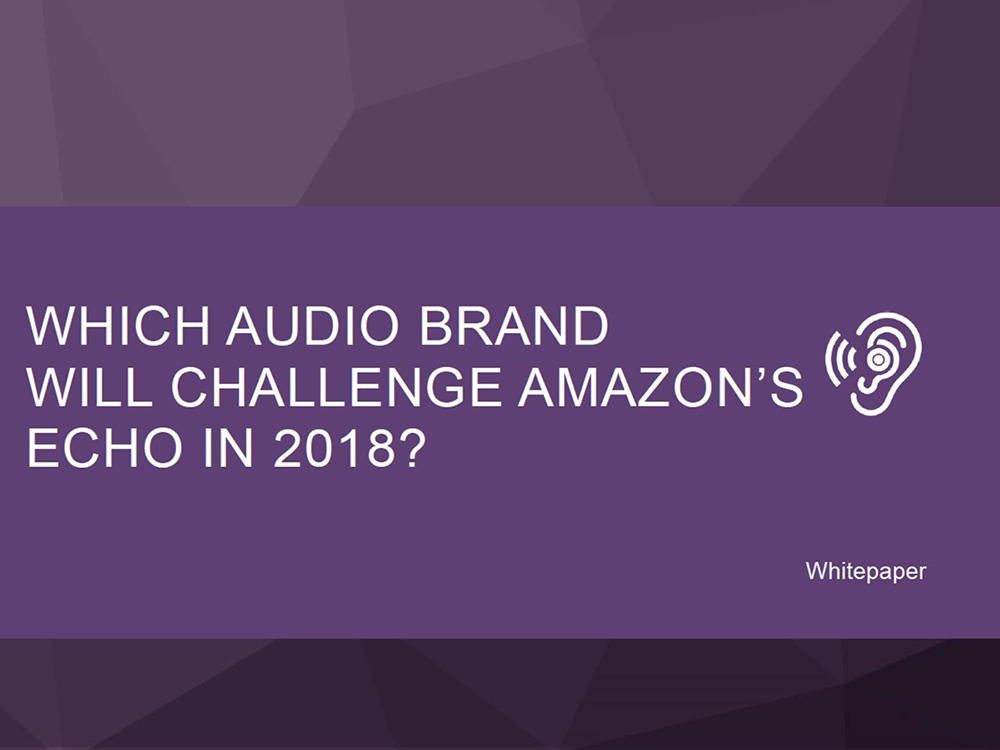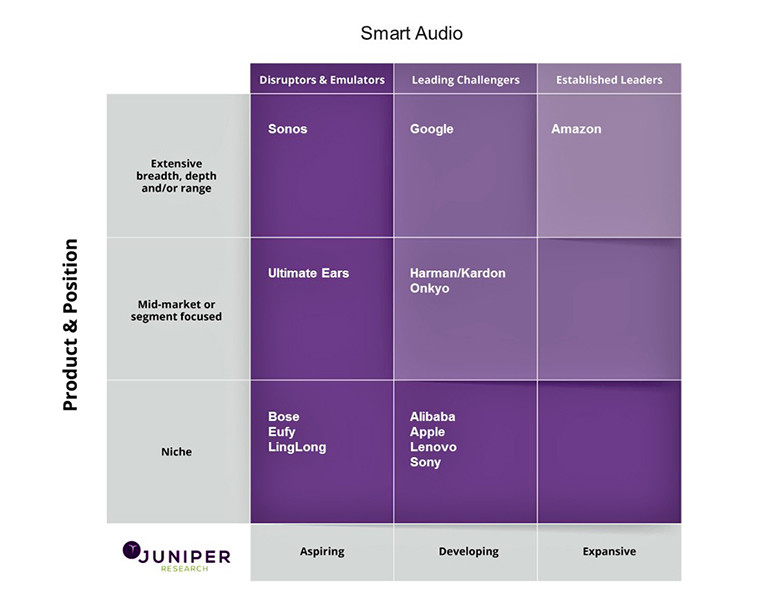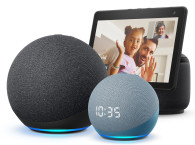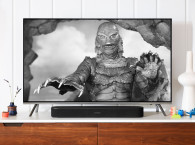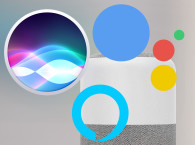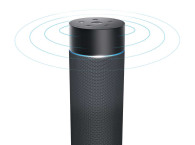Amazon, with its wide range of Echo devices and a large number of third party firms using Alexa as a voice interface, is currently the clear leader in the smart audio category. According to Juniper Research, the one area that Amazon needs to improve is the management of capabilities of the Alexa platform as distinct from Echo devices, as the two are currently synonymous in the industry and any capability gaps may confuse and alienate both users and partners as these differences become apparent.
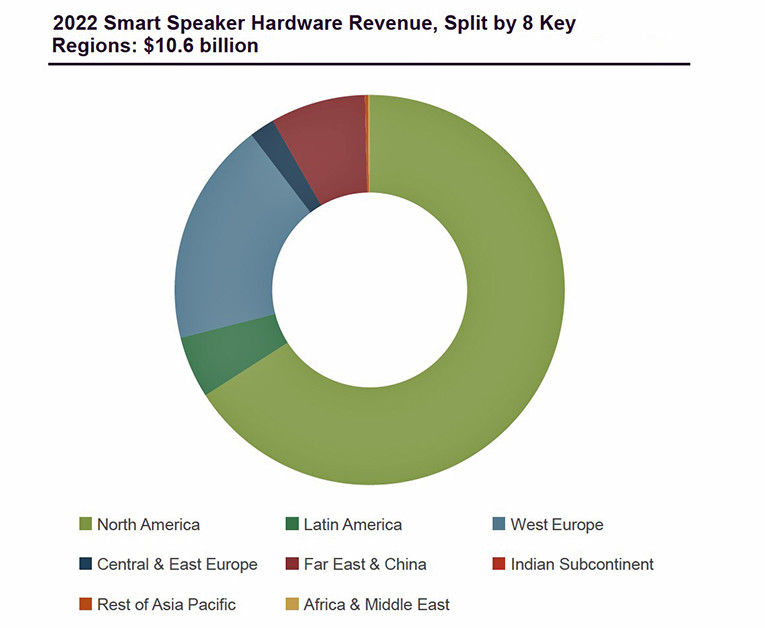
Challenging Amazon's lead, according to the new report, there are some consumer electronics and audio companies that have a range of competing smart audio devices, but are either positioned towards a smaller market, or offer a more limited range of devices.
Google has a smaller set of first-party smart audio devices to Amazon, with a wider range of third party audio partners but does not have the same market presence and association as Amazon. Juniper also thinks its devices do not support the extension of its smart audio system across existing setups as completely. "In the short term the lack of such a device may harm uptake of its smart audio ecosystem," the market research company says.
Harman, including its established brands Harman/Kardon and JBL, offers wireless speakers that integrate with Alexa, Cortana and Google Assistant, giving the widest range of smart audio integrations currently available. "However, these are all tied to specific devices, limiting customer device choice to particular platforms. When the company expands to multi-assistant devices, partly under way thanks to an Amazon-Microsoft agreement, they will be able to cater to a wide array of aesthetics and use cases for smart audio, allowing them to have a strong range of products and users," Juniper states.
"Audio company Onkyo has released the VC-FLX1 on the premise of an Echo-like device with better audio and a similar product to Google Assistant in the VC-GX30. However, with the current device range, the smart audio elements may only extend to part of their products, leaving an incomplete smart audio experience," the report states.
The incumbent disruptors, according to Juniper Research, is where the majority of smart audio players are situated, given the relative infancy of the market. These vendors typically have either very few smart audio devices in the market, little way to connect them to an existing audio network, or both.
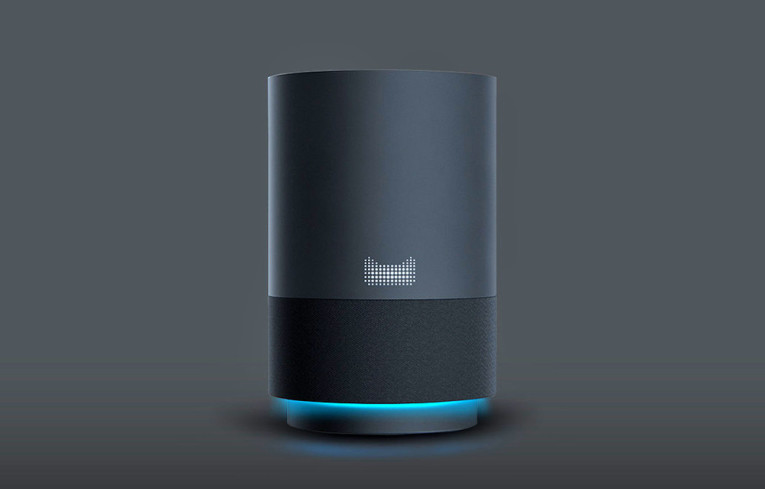
"Alibaba entered the smart audio market with the release of the Tmall Genie, which will follow a very similar strategy to Amazon in that it can provide Alibaba another gateway onto its eCommerce platform. The company does need to work on both the hardware and software of the device, which are limited on both sides in comparison to other companies in the space," Juniper says.
"Apple’s HomePod product is positioned as a premium audio product beyond any smarts it may have, despite the ability to integrate with both HomeKit and AirPlay via Siri. In the absence of both audio system partnerships and products; this means that they can only be considered a fringe player in smart audio at present. This will be remedied quite quickly when the HomePod is released in 2018, although by that time other premium audio players, most notably Sonos, may have claimed many of the HomePod’s initial customers," Juniper predicts. "Apple will have to generate interest in its own products purely based on the synergy with its services, rather than its preferred messaging around audio quality."
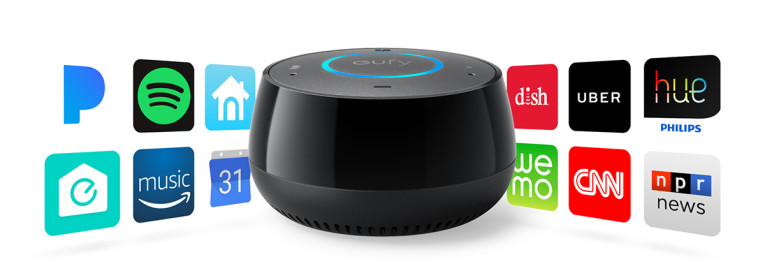
"Sonos is presenting itself as a universal company for smart audio, endeavoring to secure partnerships for all voice assistants on a single device. While this approach is ambitious and will be the future of these devices, at present they have only secured Alexa on their sole smart speaker offering. Despite this, Sonos is well-positioned to capture would-be HomePod buyers and others not yet committed to a smart audio ecosystem, leaving it in a strong position to grow its presence here once their full partnerships are in place," the report states.
Further insights on how these and other players will shape the 2018 market is available in Juniper’s complimentary whitepaper, "Which Audio Brand Will Challenge Amazon’s Echo in 2018?", which can be downloaded here.
The report shows that the smart speaker market is largely divided by sector and brand. Tech companies are building from a digital assistant perspective, while audio vendors see them as a way to make their products more relevant and feature rich. Only Apple is breaking this pattern, with the HomePod positioned as an intelligent audio device rather than a platform for Siri.
These different approaches affect several elements of product design, with a large impact on prices. The research shows how devices costing over $200 will take over 40% of sector revenue while being only 16% of shipments in 2022, as voice assistants proliferate in premium audio.
The research found a window of opportunity exists for tech companies to act before audio players integrate smart capabilities fully into more devices. “Amazon is the current leader in smart speakers because they were first to build a complete smart audio ecosystem,” remarks research author James Moar. “Few audio brands currently integrate voice assistants throughout their portfolio, so users wanting smart audio will need workaround devices for some years to come.”
The Amazon Echo Dot is the leading device of this type. However, Juniper expects growth for the Dot to slow over the next 5 years as audio brands introduce more smart audio speakers of their own.
www.juniperresearch.com



